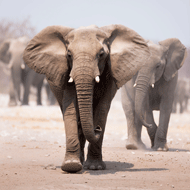UK soldiers head to Gabon to tackle poaching

Nearly 90 per cent of Gabon is forested and highly sophisticated gangs operate under dense canopy.
UK soldiers have been deployed to Gabon in West Africa to help tackle ivory poaching, which has brought the forest elephant population to the brink of extinction.
Over the past 10 years, more than 15,000 forest elephants have been killed by poachers in the Minkebe National Park alone - leaving an estimated population of just 7,000.
At the request of Gabon's president, Ali Bongo, a team of soldiers from Northern Ireland headed to a military training centre at Mokekou - which is a nine-hour drive from the nearest centre of population.
The team is drawn from a range of units, including the Rifles and Scots, to provide a range of operational skills and training to support Gabon park rangers.
Major Mark Shercliff, who is heading up the team, said he is under no illusions about the challenges ahead.
Nearly 90 per cent of Gabon is forested and highly sophisticated gangs operate under dense canopy.
"It’s a challenging environment for the Park Agencies in Gabon and for us as soldiers", he explained. "With a range of forestation across a hilly environment it is not a straightforward task."
While Major Shercliff believes military input can help on a tactical level, it cannot solve the problems on its own.
"There is a lot of work to be done above us all in the political sphere by getting countries around the world to combat poaching in a way that is joined up – this is not a phenomenon that belongs to a single country or single continent.”



 The Animal and Plant Health Agency (APHA) has updated its online reporting service for dead wild birds.
The Animal and Plant Health Agency (APHA) has updated its online reporting service for dead wild birds.